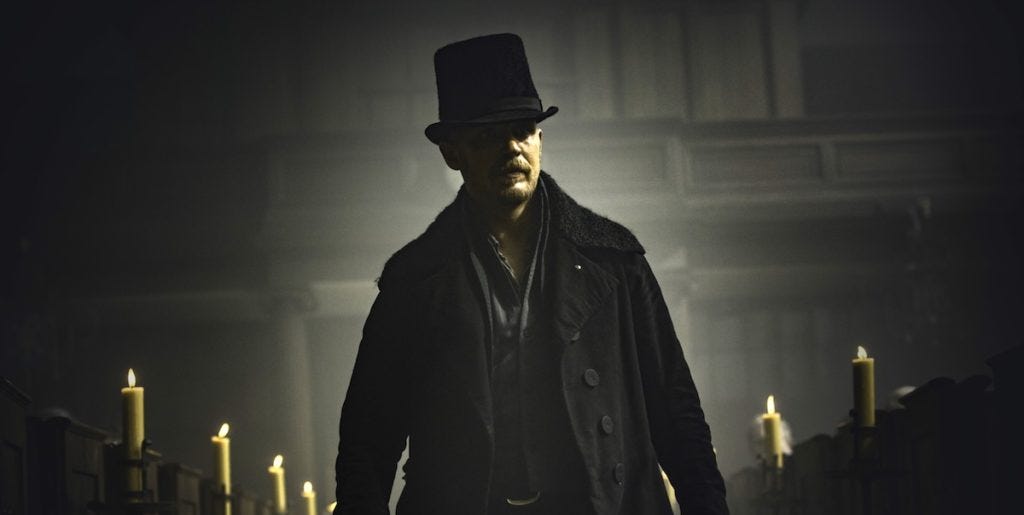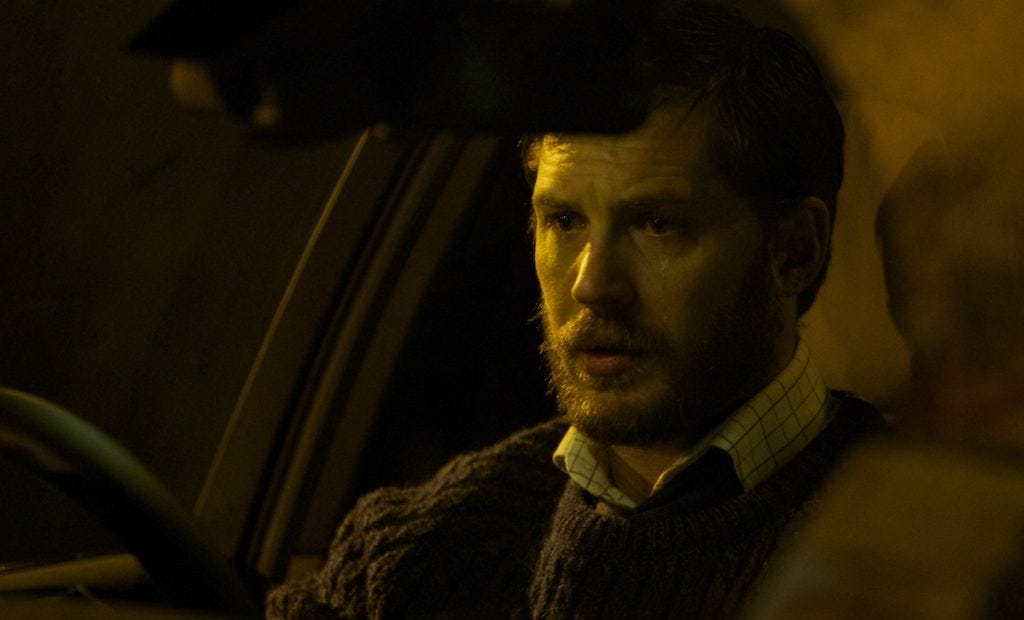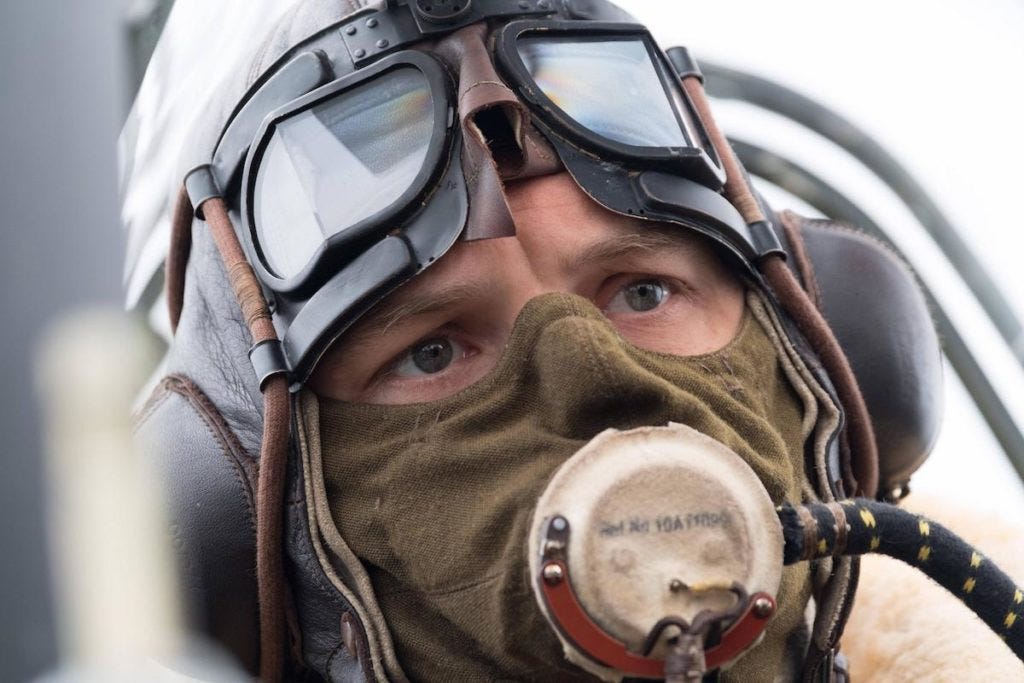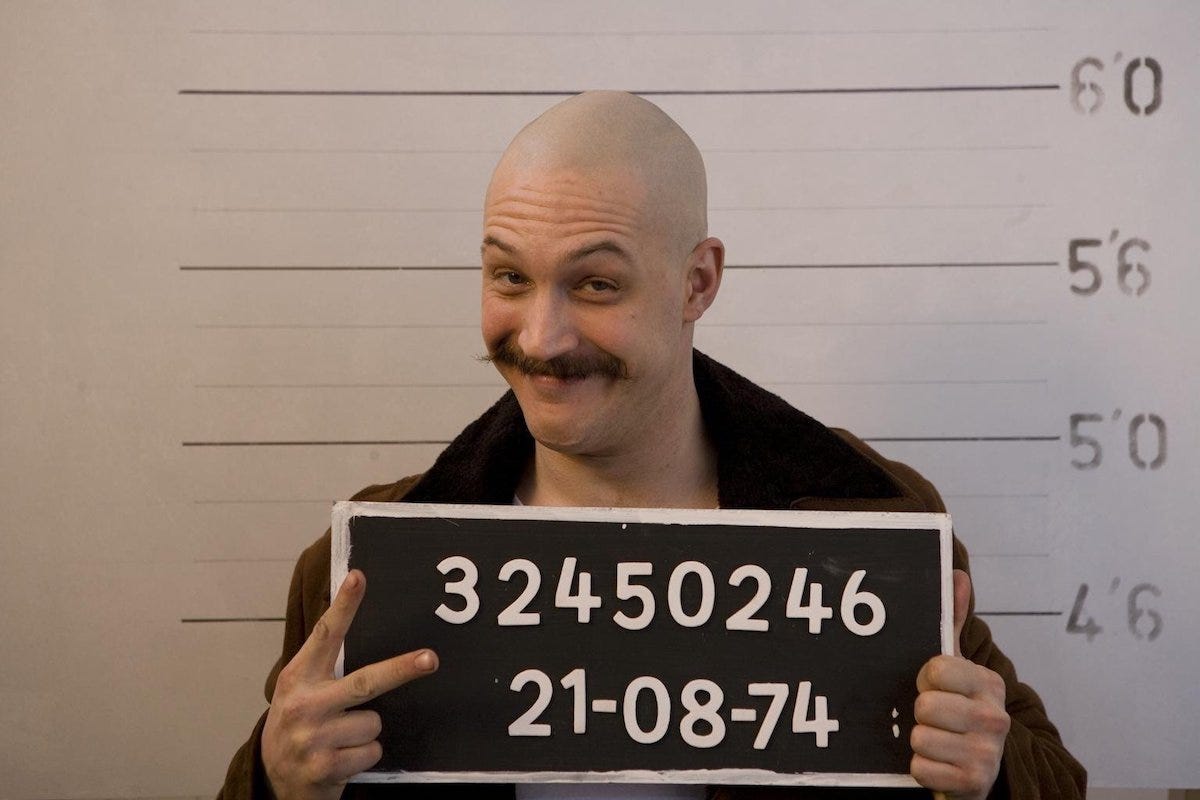The Eyes of Tom Hardy
The Venom star can stare through the screen and into your soul.
There’s a moment in Stephen King’s The Dark Half that demands to be portrayed on a screen large or small by Tom Hardy.
It comes roughly a third of the way through the book, which is about a writer who is overtaken by his own creation and becomes a murderous psychopath in a way that reflects the killings in his works. The murderous alter ego is in the midst of some very nasty business when the following exchange occurs:
Farther down the hall a door opened and a man in a blue pajama shirt with his hair in sleep-corkscrews poked his head and shoulders out.
“What’s going on?” he cried in a gruff voice which proclaimed that he didn’t care if it was the Pope of Rome out here, the party was over.
“Murder,” Stark said conversationally, and for just a moment his eyes shifted from the bloody, howling man in front of him to the man in the doorway. Later this man would tell the police that the intruder’s eyes were blue. Bright blue. And utterly mad. “Do you want some?” From that moment forward I could see Tom Hardy and Tom Hardy alone in this role in the adaptation* we’re sure to get one of these days, given recent successes by King adaptations. There are few other actors who could pull off that deadpan mania, a sort of charismatically murderous glint in the eye that freezes everyone onscreen—as well as everyone offscreen—to the spot. You can just see Hardy’s head tilting a bit, a half-grin flashing for a brief second even as the eyes remain dead while he asks the question:
“Murder—do you want some?”

Tom Hardy likely flashed into my head since, at the time, I watching his show Taboo, a program in which Tom Hardy did a lot of grunting, staring, and murdering. Nominally concerning the political, territorial, and commercial intrigues between the United States and Great Britain (as well as the much-feared East India Company) that reach fever pitch while the War of 1812 rages, Taboo was far more interesting as a showcase for Tom Hardy and the various ways in which he can silently, or nearly silently, convey menace.
Striding about the mud-strewn streets of the just-past-colonial America, a mid-length trench coat flaring out behind him like a cape more suited for a superhero, even Hardy’s walk conveys murderous intent. Fists balled, one shoulder lurching in front of the other, face scarred and partially obscured by a black top hat conveying both class status and a mockery of the class system whence Hardy’s James Delaney has fled (and, indeed, is at active war with), Hardy looks ripped from the pages of a Gothic horror.
Taboo was created by Hardy and his father, the writer Chips Hardy, along with Steven Knight. Tom Hardy previously worked with Knight on the series Peaky Blinders, in which he played a Jewish gangster, one whose ferocity and brutality hides a keen intellect and a grandmaster’s sense of strategy. Well, his ferocity, brutality, and his mumbling; this is one of those Hardy roles best watched with the subtitles on. Not because his voice is obscured or altered, as in a Nolan flick—we’ll get to those in a moment—but because of his character’s accent. Hardy loves his accents; the best of them was deployed during The Revenant, a film overrated upon release and during awards season but one that is still eminently watchable thanks almost entirely to Hardy, whose Mid-Atlantic drawl was instantly recognizable to anyone whose spent time with those raised in the triangle of land formed between Philly, Bawlmore, and Bowie.
The clipped Welsh intonations of Hardy’s Ivan Locke in Locke (another Steven Knight project) take center stage because the entire film is just Hardy, in a car, monologuing with the specter of his father and dialoguing with a family he’s letting down by driving to his destiny: He’s off to be at the birth of his bastard son, a responsibility he cannot shirk having been born to an absent father himself. The film is claustrophobic, taking place entirely within the confines of a car as the man’s life comes crashing down around him: his personal life, yes, but his professional life too. He’s supposed to be on hand for the biggest concrete pour (non-nuclear, non-military division) in European history; instead he has to talk his underlings through it. If you’ve ever wanted to learn about concrete and its grades and what it takes to make the gray sludge beautiful and pure and strong, have I got a film for you: people talk about being happy to listen to actors read the phone book, but Hardy’s practically done it with Locke and the gray sludge that undergirds our skyscrapers.

Again, though, it’s Hardy’s eyes that sell the movie as much as anything else, the way in which he’s constantly peering through the rearview mirror into the empty back seat of his SUV as he wrestles with the demon of his absent father and the hole it left in his soul. His eyes are so keen and expressive that it feels as though Hardy’s most accomplished creative partner, Christopher Nolan, uses them as a way to challenge not only himself but his actor.
How else to explain the decision to put Tom Hardy in Bane’s mask for the entirety of The Dark Knight Rises, not only covering his face but also obscuring his voice? The next time you watch Rises, pay attention to Hardy’s eyes during the Blackgate Prison speech. It’s a brilliant piece of pitch-black comic satire, the words of a populist politician delivered by a madman, his hidden mouth unable to demonstrate the scorn he has for the people he is manipulating into rioting. There’s a physicality to the gestures he makes as he delivers the remarks, a fluid strength that Hardy has used to his advantage in moments as varied as the vaudevillian asides in Bronson or the MMA grappling of Warrior. But if you look at the eyes—if you focus on them as they crinkle and roll about—you can see just how absurd Bane knows his words to be. How foolish he thinks those he is imploring to take back Gotham. How grotesque he views their impotent greed and jealousy.
And then there’s Dunkirk. Hardy—masked again, confined in a tight space again—brings as much drama to marking the fuel levels after his gauge is destroyed as he does to taking aim and lighting up the enemy aircraft that cross his cockpit. But it’s the closing shots of Dunkirk that stick with me. Hardy’s character, having set fire to his airplane so the Germans cannot capture it, stands before the dusky light and the flickering flames as Churchill’s “We Shall Fight on the Beaches” speech is read offscreen: “And even if, which I do not for a moment believe, this island were subjugated and starving, then our empire beyond the seas, armed and guarded by the British fleet, would carry on the struggle. Until, in God’s good time, the New World with all its power and might steps forth to the rescue and the liberation of the old.”
As the words spill forth, Hardy is grabbed by Germans; the last we see his eyes they are lit by the flames engulfing his plane. There is sadness, but defiance as well, and as the film draws to a close—as Churchill’s reminder that the New World is the safeguard against the global threat of fascism; as the plane representing the Old World in midst of a literal and figurative retreat burns—we cut to an answering set of eyes, that of a young Tommy, thoughtful. Wondering when—or maybe if—the New World is finally going to get its shit together.

“You mustn’t be afraid to dream a little bigger darling.” This is, perhaps, the moment when most Americans—who were slow to embrace the Guy Ritchie-produced Layer Cake and remain strangely cold to the Guy Ritchie-directed RockNRolla, both of which are great and both of which Hardy had small parts in—were introduced to Hardy. I remember the line being in ads and trailers for his first movie with Nolan, but maybe it was so good I’ve incepted myself into believing this. Either way, Hardy’s never been short of dreams and ambition.
Sometimes this pays off greatly, as it did in Mad Max: Fury Road, his natural reserve echoing the quiet cool and calm of Mel Gibson’s Max. Sometimes it doesn’t at all, as in the ill-fated action romcom This Means War with Chris Pine and Reese Witherspoon.
Venom—the 2018 Marvel movie that has a sequel out this week—lets Hardy do a couple of things he clearly enjoys: monkey about with voices and accents and do some serious physical comedy. There’s something delightfully absurd about the ways in which he has conversations with himself, a sort of monologue-as-dialogue that makes vocal what all of us go through internally on any given day. He’s also clearly invested in the success of these movies, grabbing a writing credit on the sequel.
And yet it feels slightly off. Like we’re missing something important. It’s the big white CGI eyes that he’s forced to sport for so much of these movies, I think, an effect that deprives us of a singular pleasure: being stared down by a Tom Hardy hellbent on murder.
And yes: we all want some.
*George Romero adapted the book originally in 1993 with Timothy Hutton in the lead role; director Alex Ross Perry was attached to a remake as of 2019.



